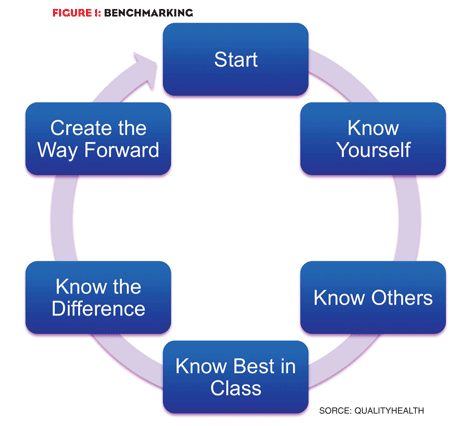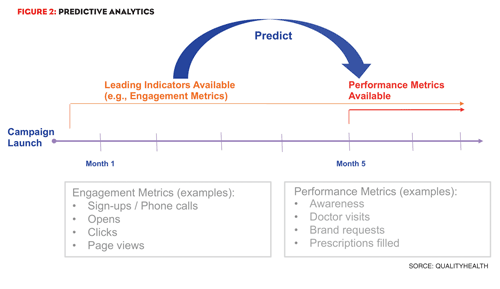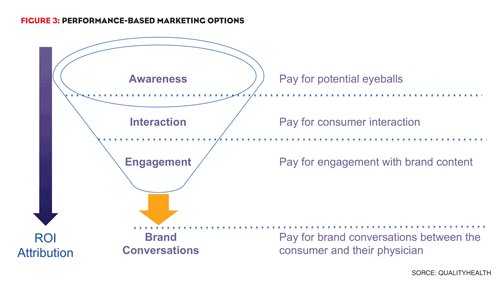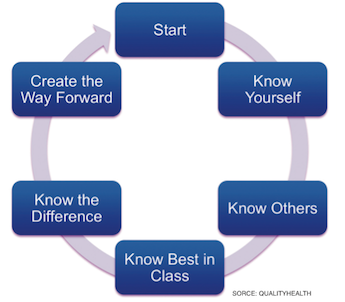Evaluating options for increasing ROI in direct-to-consumer campaigns.
No one’s using guesswork anymore. DTC marketers today do the right things to set up a smart DTC campaign:
- Identify the consumer target
- Home in on a behavior-inducing insight
- Build persuasive creative
- Buy targeted media
- Identify critical results
- Invest in a robust measurement plan
Measurement generally starts upon launch of the campaign. On average, marketers know eight months after going live if their earliest efforts are reaching the right consumers, taking them through their decision process, motivating them to go to the doctor to ask for their brand and actually driving new prescriptions. Eight months! As Merkle’s Peter Mehr recently asked at a meeting I attended, “Is this any way to run a business?”
With the state of the industry at its most challenging and the financial pressures on DTC marketers at a historical high, brands cannot afford the luxury of hindsight. The pressing question has become: How can we know if our marketing is going to work before we spend significantly on media?
Here are four approaches to consider including as part of your toolkit prior to launching DTC, regardless of the media channel.
Benchmarking: This is the process of comparing your planned campaign to a historical campaign of similar dimensions in order to predict likelihood of success. If, for example, you are launching display advertising in, for example, the allergy category, you should know what your allergy predecessors have done in display (media spend, media plan, creative, measures of success), what tradeoffs they made and if and how their decisions drove results. You should also know what some best-in-class display campaigns looked like, and why they achieved their success.
With benchmarking, you are using real data from real events to help in your analysis. Yet, benchmarking is as much an art as it is a science. First, there are no official sources for benchmarking case studies and data. Often, you will need to piece the story together: your sources for such information are likely going to be personal conversations with other marketers, reconnaissance your agencies or consulting partners do for you, or published case studies in the pharmaceutical trade press. Second, your conclusions will be subjective, based on qualitative analysis. While the advantage of human judgment is that it takes into account existing market trends and expected changes, it is subject to a number of shortcomings and should be evaluated as such.
Simulation Modeling:
Like a time machine, simulation models can be used to replicate what is going to happen as a result of market forces, consumer dynamics, marketing efforts, and product design. Various brand-provided inputs from market research and media planning are used to build a volumetric model that simulates reality and produces an estimate of what your market growth will be based on your marketing efforts and spend. Your inputs are real, but the output is theoretical and you get a prediction (within a margin of error) of how well your marketing will work. Companies like Nielsen (BASES) and Ipsos (MMA) offer solutions and a depth of experience in the pharmaceutical industry. This accuracy comes at a price, most easily absorbed in higher media budgets.
Predictive Analytics:
This approach uses consumer engagement metrics like open or click rates, BRC responses, inbound call volume, and website traffic, which are available immediately upon campaign launch to predict the sales, profit, and ROI gain from the campaign. Engagement metrics are identified and, as the campaign unfolds, are captured, analyzed, and linked to performance metrics. This linkage happens initially via analogs, then through campaign-specific information as it becomes available. The real value of predictive analysis is the ability it provides to modify and optimize your campaign to improve engagement and therefore performance early on in the campaign. Several CRM and database management companies have successfully translated their experience using predictive analytics in other industries to pharma.
Performance-Based Marketing:
Finally, performance-based marketing describes marketing services where you buy based on performance. Rather than figuring out if your marketing will work, you pay only when it does work. The performance-based marketing service provider manages awareness, interaction, and engagement in order to deliver a marketing result, such as sending a consumer to a doctor to ask for your brand. The brand manager only pays when a desired behavior, such as a brand conversation, takes place. The marketing service provider is going after the same results as the brand—proponents say that this creates a win-win situation that aligns both parties’ interests to drive higher sales.
While buying based on performance limits your financial risk and ensures efficiency, the approach requires a certain degree of volume and effectiveness to deliver against your NRx goals. Performance-based marketing, well entrenched in other industries, is fast gaining traction in pharma. Search, digital properties, some agencies (such as Rosetta), and even print publishers (most notably Meredith) are leading the performance- based marketing charge.
Which method you pick for your brand will largely be determined by the size of your stake, available resources, your or your company’s comfort level, and how you plan to use what you learn.








